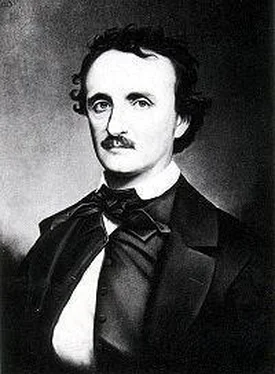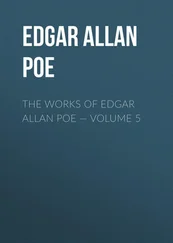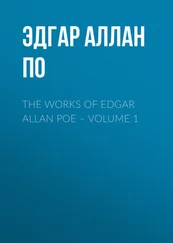Эдгар По - Works of Edgar Allan Poe
Здесь есть возможность читать онлайн «Эдгар По - Works of Edgar Allan Poe» весь текст электронной книги совершенно бесплатно (целиком полную версию без сокращений). В некоторых случаях можно слушать аудио, скачать через торрент в формате fb2 и присутствует краткое содержание. Жанр: Старинная литература, на английском языке. Описание произведения, (предисловие) а так же отзывы посетителей доступны на портале библиотеки ЛибКат.
- Название:Works of Edgar Allan Poe
- Автор:
- Жанр:
- Год:неизвестен
- ISBN:нет данных
- Рейтинг книги:4 / 5. Голосов: 1
-
Избранное:Добавить в избранное
- Отзывы:
-
Ваша оценка:
- 80
- 1
- 2
- 3
- 4
- 5
Works of Edgar Allan Poe: краткое содержание, описание и аннотация
Предлагаем к чтению аннотацию, описание, краткое содержание или предисловие (зависит от того, что написал сам автор книги «Works of Edgar Allan Poe»). Если вы не нашли необходимую информацию о книге — напишите в комментариях, мы постараемся отыскать её.
Works of Edgar Allan Poe — читать онлайн бесплатно полную книгу (весь текст) целиком
Ниже представлен текст книги, разбитый по страницам. Система сохранения места последней прочитанной страницы, позволяет с удобством читать онлайн бесплатно книгу «Works of Edgar Allan Poe», без необходимости каждый раз заново искать на чём Вы остановились. Поставьте закладку, и сможете в любой момент перейти на страницу, на которой закончили чтение.
Интервал:
Закладка:
And now, from the wreck and the chaos of the usual senses, there appeared to have arisen within me a sixth, all perfect. In its exercise I found a wild delight - yet a delight still physical, inasmuch as the understanding had in it no part. Motion in the animal frame had fully ceased. No muscle quivered; no nerve thrilled; no artery throbbed. But there seemed to have sprung up in the brain, that of which no words could convey to the merely human intelligence even an indistinct conception. Let me term it a mental pendulous pulsation. It was the moral embodiment of man's abstract idea of Time. By the absolute equalization of this movement - or of such as this - had the cycles of the firmamental orbs themselves, been adjusted. By its aid I measured the irregularities of the clock upon the mantel, and of the watches of the attendants. Their tickings came sonorously to my ears. The slightest deviations from the true proportion - and these deviations were omni-prævalent - affected me just as violations of abstract truth were wont, on earth, to affect the moral sense. Although no two of the time-pieces in the chamber struck the individual seconds accurately together, yet I had no difficulty in holding steadily in mind the tones, and the respective momentary errors of each. And this - this keen, perfect, self-existing sentiment of duration - this sentiment existing (as man could not possibly have conceived it to exist) independently of any succession of events - this idea - this sixth sense, upspringing from the ashes of the rest, was the first obvious and certain step of the intemporal soul upon the threshold of the temporal Eternity.
It was midnight; and you still sat by my side. All others had departed from the chamber of Death. They had deposited me in the coffin. The lamps burned flickeringly; for this I knew by the tremulousness of the monotonous strains. But, suddenly these strains diminished in distinctness and in volume. Finally they ceased. The perfume in my nostrils died away. Forms affected my vision no longer. The oppression of the Darkness uplifted itself from my bosom. A dull shock like that of electricity pervaded my frame, and was followed by total loss of the idea of contact. All of what man has termed sense was merged in the sole consciousness of entity, and in the one abiding sentiment of duration. The mortal body had been at length stricken with the hand of the deadly Decay.
Yet had not all of sentience departed; for the consciousness and the sentiment remaining supplied some of its functions by a lethargic intuition. I appreciated the direful change now in operation upon the flesh, and, as the dreamer is sometimes aware of the bodily presence of one who leans over him, so, sweet Una, I still dully felt that you sat by my side. So, too, when the noon of the second day came, I was not unconscious of those movements which displaced you from my side, which confined me within the coffin, which deposited me within the hearse, which bore me to the grave, which lowered me within it, which heaped heavily the mould upon me, and which thus left me, in blackness and corruption, to my sad and solemn slumbers with the worm.
And here, in the prison-house which has few secrets to disclose, there rolled away days and weeks and months; and the soul watched narrowly each second as it flew, and, without effort, took record of its flight - without effort and without object.
A year passed. The consciousness of being had grown hourly more indistinct, and that of mere locality had, in great measure, usurped its position. The idea of entity was becoming merged in that of place. The narrow space immediately surrounding what had been the body, was now growing to be the body itself. At length, as often happens to the sleeper (by sleep and its world alone is Death imaged) - at length, as sometimes happened on Earth to the deep slumberer, when some flitting light half startled him into awaking, yet left him half enveloped in dreams - so to me, in the strict embrace of the Shadow came that light which alone might have had power to startle - the light of enduring Love. Men toiled at the grave in which I lay darkling. They upthrew the damp earth. Upon my mouldering bones there descended the coffin of Una.
And now again all was void. That nebulous light had been extinguished. That feeble thrill had vibrated itself into quiescence. Many lustra had supervened. Dust had returned to dust. The worm had food no more. The sense of being had at length utterly departed, and there reigned in its stead - instead of all things - dominant and perpetual - the autocrats Place and Time. For that which was not - for that which had no form - for that which had no thought - for that which had no sentience - for that which was soulless, yet of which matter formed no portion - for all this nothingness, yet for all this immortality, the grave was still a home, and the corrosive hours, co-mates.
{*1} It will be hard to discover a better [method of education] than that which the experience of so many ages has already discovered; and this may be summed up as consisting in gymnastics for the body and music for the soul."–Repub. lib. 2. "For this reason is a musical education most essential; since it causes Rhythm and Harmony to penetrate most intimately into the soul, taking the strangest hold upon it, filling it with beauty and making the man beautiful-minded... He will praise and admire the beautiful; will receive it with joy into his soul, will feed upon it, and assimilate his own condition with it." Ibid. lib. 3. Music mousika had, among the Athenians, a far more comprehensive signification than with us. It included not only the harmonies of time and of tune, but the poetic diction, sentiment and creation each in its widest sense. The study of music was with them in fact, the general cultivation of the taste–of that which recognizes the beautiful–in contra-distinction from reason, which deals only with the true.
{*2} History," from istorein, to contemplate.
{*3} The word "purification" seems here to be used with reference to its root in the Greek, pur, fire.
________
The End | Go to top
Death of Edgar A. Poe
BY N. P. WILLIS
THE ancient fable of two antagonistic spirits imprisoned in one body, equally powerful and having the complete mastery by turns-of one man, that is to say, inhabited by both a devil and an angel seems to have been realized, if all we hear is true, in the character of the extraordinary man whose name we have written above. Our own impression of the nature of Edgar A. Poe, differs in some important degree, however, from that which has been generally conveyed in the notices of his death. Let us, before telling what we personally know of him, copy a graphic and highly finished portraiture, from the pen of Dr. Rufus W. Griswold, which appeared in a recent number of the "Tribune:"
"Edgar Allen Poe is dead. He died in Baltimore on Sunday, October 7th. This announcement will startle many, but few will be grieved by it. The poet was known, personally or by reputation, in all this country; he had readers in England and in several of the states of Continental Europe; but he had few or no friends; and the regrets for his death will be suggested principally by the consideration that in him literary art has lost one of its most brilliant but erratic stars.
"His conversation was at times almost supramortal in its eloquence. His voice was modulated with astonishing skill, and his large and variably expressive eyes looked repose or shot fiery tumult into theirs who listened, while his own face glowed, or was changeless in pallor, as his imagination quickened his blood or drew it back frozen to his heart. His imagery was from the worlds which no mortals can see but with the vision of genius. Suddenly starting from a proposition, exactly and sharply defined, in terms of utmost simplicity and clearness, he rejected the forms of customary logic, and by a crystalline process of accretion, built up his ocular demonstrations in forms of gloomiest and ghastliest grandeur, or in those of the most airy and delicious beauty, so minutely and distinctly, yet so rapidly, that the attention which was yielded to him was chained till it stood among his wonderful creations, till he himself dissolved the spell, and brought his hearers back to common and base existence, by vulgar fancies or exhibitions of the ignoblest passion.
Читать дальшеИнтервал:
Закладка:
Похожие книги на «Works of Edgar Allan Poe»
Представляем Вашему вниманию похожие книги на «Works of Edgar Allan Poe» списком для выбора. Мы отобрали схожую по названию и смыслу литературу в надежде предоставить читателям больше вариантов отыскать новые, интересные, ещё непрочитанные произведения.
Обсуждение, отзывы о книге «Works of Edgar Allan Poe» и просто собственные мнения читателей. Оставьте ваши комментарии, напишите, что Вы думаете о произведении, его смысле или главных героях. Укажите что конкретно понравилось, а что нет, и почему Вы так считаете.












